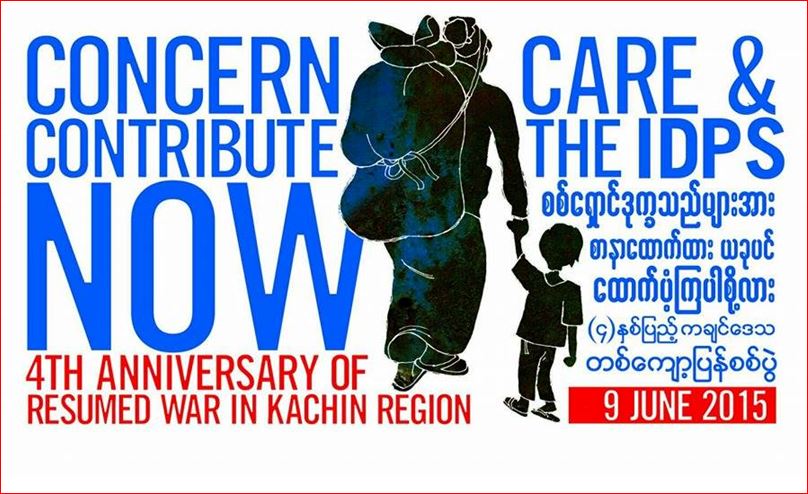Posts Tagged ‘Human Rights Violations’ (349 found)
Human Rights are Called Universal for a Reason – In English and Burmese
For many years in Burma, a person carrying a copy of the Universal Declaration of Human Rights risked arrest and even jail. Underground human rights networks distributed copies and organised discussions on the articles it contained […]
• • •KWO Six Months Summary of Human Rights Violations in Karen State: January to June 2015
The Karen Women’s Organization (“KWO”) collected information regarding continuing serious human rights abuses perpetrated by the Burma Army in all seven districts in Karen State from January to June 2015. Our data demonstrates that the Burma Army has taken advantage of the preliminary ceasefire to continue to commit serious human rights abuses, perpetrate direct attacks on civilians and expand its presence in Karen State […]
• • •Kachin State Natural Resources Development Discussion Paper
 This policy discussion paper is based on our experiences and findings of our community research over the last ten years, documenting the impacts of centralized mega development projects on peoples across Kachin state. We did this research together with local communities, including in Hukawng, Hpakant, Putao, Chibwe, Tangphre as well as others. This paper also draws on experiences and solutions from other countries where there has been conflict over natural resources. We hope this paper will contribute to the debate over political solutions to allow the future generations of Kachin state to benefit from its natural resources […]
This policy discussion paper is based on our experiences and findings of our community research over the last ten years, documenting the impacts of centralized mega development projects on peoples across Kachin state. We did this research together with local communities, including in Hukawng, Hpakant, Putao, Chibwe, Tangphre as well as others. This paper also draws on experiences and solutions from other countries where there has been conflict over natural resources. We hope this paper will contribute to the debate over political solutions to allow the future generations of Kachin state to benefit from its natural resources […]
Myanmar: All Parties Must Immediately Halt Child Recruitment and Use
London, 2 July 2015 – The Myanmar military and the Kachin Independence Army (KIA) should immediately end the recruitment and use of children under the age of 18 years and release all those recruited under-18 within their ranks, Child Soldiers International said in new research released today […]
• • •Civilians Injured by Burma Army Shelling and Beating in Panglong, Southern Shan State
Indiscriminate shelling by Burmese government troops in a civilian area caused serious injury to a woman on her way to her farm, north of Panglong, on June 19, 2015 […]
• • •Kachin Region: War Torn Displaced Village Profiles
 The country of Myanmar has been plagued by bitter experience of civil war and successive brutal regimes since the pre and post-independence era. The country gained independence from British colony in 1948 and a union of Myanmar was formed based on the principles enshrined in historic Panglong agreement signed by ethnic representatives from Kachin, Shan, Chin and Burmese. Karen and Mon started their ethnic armed struggle since pre-independence time […]
The country of Myanmar has been plagued by bitter experience of civil war and successive brutal regimes since the pre and post-independence era. The country gained independence from British colony in 1948 and a union of Myanmar was formed based on the principles enshrined in historic Panglong agreement signed by ethnic representatives from Kachin, Shan, Chin and Burmese. Karen and Mon started their ethnic armed struggle since pre-independence time […]
10 Most Censored Countries
Despite an end to more than four decades of pre-publication censorship in 2012, Myanmar’s media remains tightly controlled. The Printers and Publishers Registration Law, enacted in March 2014, bans news that could be considered insulting to religion, disturbing to the rule of law, or harmful to ethnic unity. […]
• • •Truth and Justice for Ko Par Gyi
I am seeking justice for my husband. My husband was captured, tortured and killed by the military in October 2014, in Kyaikmayaw in Myanmar’s Mon State. His name was Aung Kyaw Naing. He is also known as Ko Par Gyi. He was a freelance reporter […]
• • •Thailand/Burma: Sea Nomads Vulnerable to Abuse
Far from the idyllic image that tourism promotes of the Moken people, these sea nomads face increasing restrictions and attacks at sea, and systematic discrimination on land. By effectively denying them citizenship, the Thai and Burmese governments make the Moken easy targets for exploitation and other threats to their very existence […]
• • •Another Year Passes in the War Against the Kachin, the International Community Must Pressure the Burma Government
 On 9 June 2015, the latest summit of ethnic armed organizations (EAOs) concluded in Law Khee Lar, Karen State. On the very same day four years ago, Burma Army broke its 17-year-old ceasefire agreement with the Kachin Independence Army (KIA), and launched a relentless offensive in Kachin and northern Shan State. As EAOs, including the KIA, were reaffirming their unity, organizations around the world displayed solidarity with those suffering from this four year war, calling for conflict to end, and humanitarian aid to be delivered to over 120,000 displaced by this bloody and ruthless war […]
On 9 June 2015, the latest summit of ethnic armed organizations (EAOs) concluded in Law Khee Lar, Karen State. On the very same day four years ago, Burma Army broke its 17-year-old ceasefire agreement with the Kachin Independence Army (KIA), and launched a relentless offensive in Kachin and northern Shan State. As EAOs, including the KIA, were reaffirming their unity, organizations around the world displayed solidarity with those suffering from this four year war, calling for conflict to end, and humanitarian aid to be delivered to over 120,000 displaced by this bloody and ruthless war […]









 All posts
All posts